Social Justice and Media Symposium: Persisting Towards, Resisting Against
In Honor of the late Moses Shumow
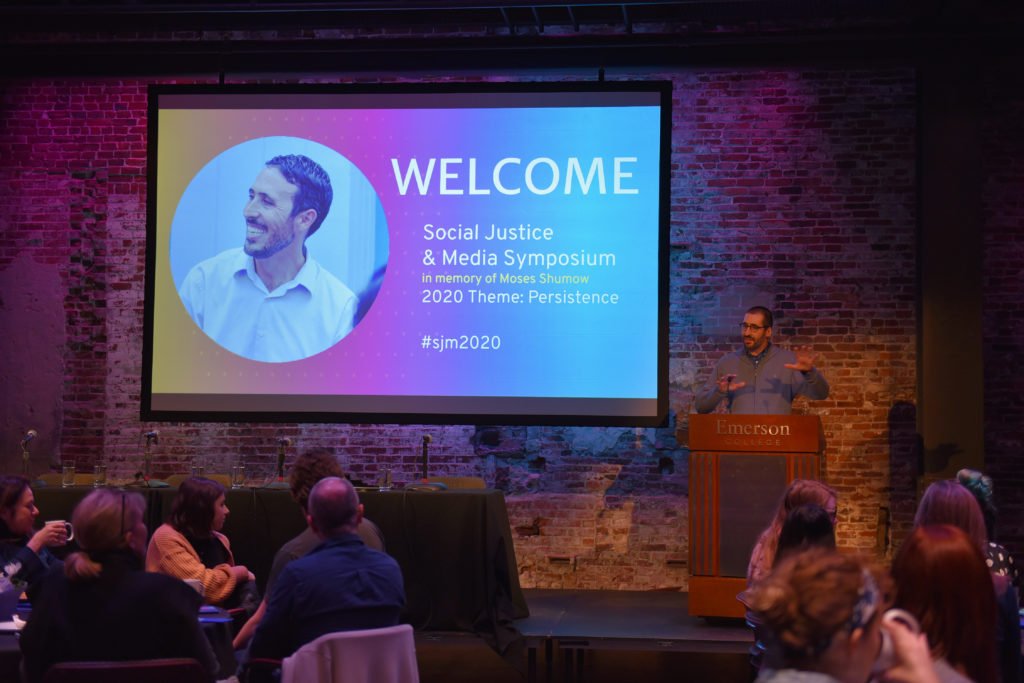
The life and legacy of Emerson’s late Journalism Professor Moses Shumow was recognized and honored during the inaugural Social Justice & Media Symposium on Feb. 28. Photo/Molly Loughman
By Molly Loughman
“To do more, be more and give back more” were the inspired words Rose Shumow received from a stranger about her late husband and Emerson journalism professor, Moses Shumow, who left a legacy of giving voices to the voiceless.
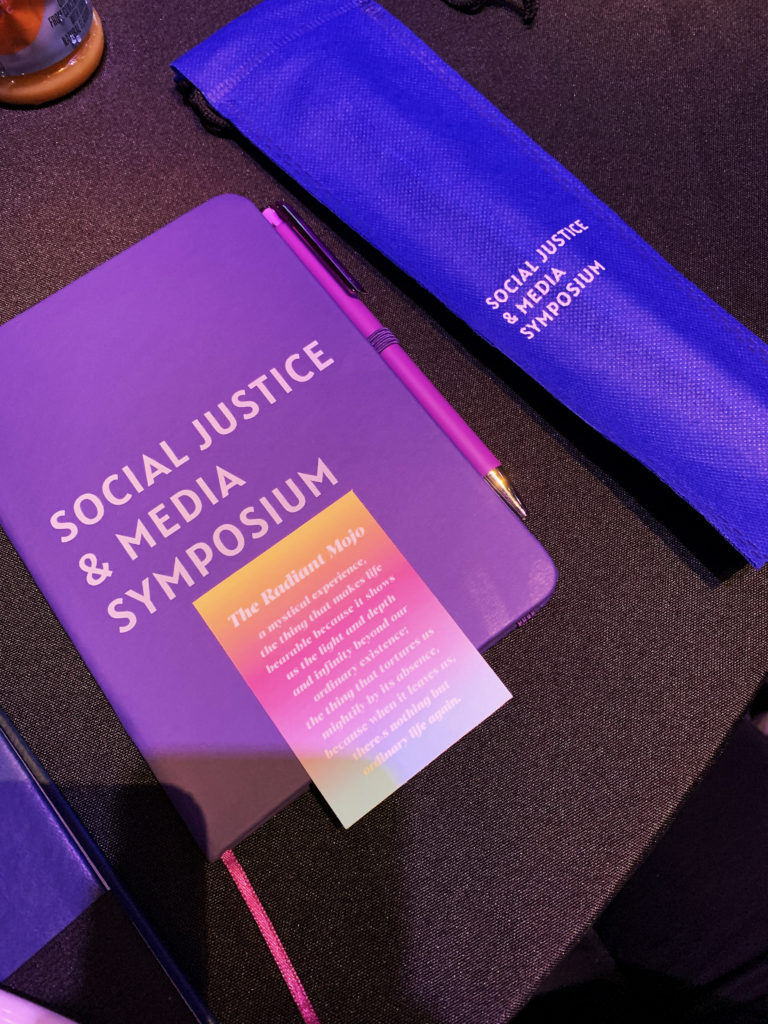
“There are very few people who can inspire or have such an impact on complete strangers in the course of their lives,” said Rose, while welcoming a roomful of attendees inside the Jackie Liebergott Black Box Theater on Feb. 28. They had gathered for the inaugural Social Justice & Media Symposium, created in memory of Moses — an educator, journalist, filmmaker, husband, father and friend.
“Moses dedicated himself to telling the stories of underserved communities because he believed that restorative narratives around people, places and events that have been marginalized could go beyond healing and into the realm of complete paradigm shifts,” said Rose. “Moses not only had a gift for storytelling, but a fervent belief in everyone’s ability to contribute to a collective good.”
Shumow’s former colleagues and students from both Emerson and Florida International University were among the dozens of attendees who spent Friday exploring how media narrative supports social justice frames and how it combats oppressive structures in today’s society.
[See the live stream video of the full event].
“We Persist Towards, We Resist Against”
The theme of the symposium: Persistence.
Spearheading the event, Paul Mihailidis, Emerson associate professor of journalism and graduate program director for media design explained, “We always used to contextualize in our work with communities [as media professionals], ‘We resist against structure, but persist towards an end.’ And we always thought persistence mattered to us because it created a frame of gathering individuals, collective struggle, embracing the emerging power that happens when people come together and build agency — And that we persist towards something that the community values,” said Mihailidis.
“So we use persistence. It’s how we use our pedagogy. It’s how we use our storytelling capacity to persist towards equitable space, and that’s how we frame our day today.”
KEYNOTE SPEAKER Catherine D’Ignazio, assistant professor of urban science and planning at MIT and a former assistant professor at Emerson, where she taught civic media & data visualization. D’Ignazio shared findings from her latest work in data feminism from a social justice perspective.
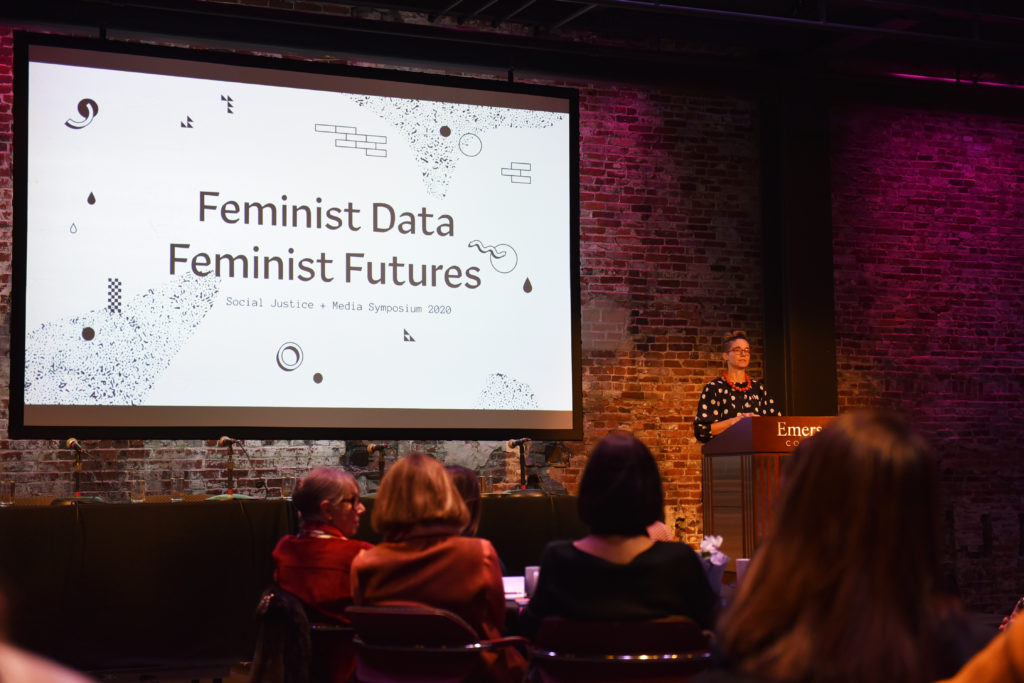
“There is a real urgency to reimagining our data, our technology, our media, our design from the ground up. With an intersectional feminism perspective... I want to advance the very not radical idea that feminist futures are everyone’s futures – so they’re for cis and trans women, for gender nonconforming people. Feminist futures are for men to learn how to undo the patriarchy, they’re for white people to learn how to dismantle racism, but we can’t do those things without the people on top.”
— Catherine D’Ignazio
A PANEL OF SCHOLARS ON “Engaged Scholarship & Persistent Pedagogy,” comprised of Shumow’s former colleagues from all over the country, discussed how they persist with media-based projects or community-based pedagogies against the barriers of conducting community work. Panelists: Sallie Hughes (moderator), University of Miami journalism and media management professor; Christopher Harris, communications professor at Nevada State College; Jessica Retis, Arizona State University journalism professor; Juliet Pinto, Pennsylvania State University journalism professor; Paola Prado, journalism professor at Roger Williams University; Robert “Ted” Gutsche Jr., media and cultural studies professor at Lancaster University; and Mihailidis.
Shumow and Harris, also Salzburg Media Academy faculty, were in the process of co-authoring a book regarding the concept of persistence and how pedagogies can contribute to persistent media engagement for social impact in a culture of transaction.
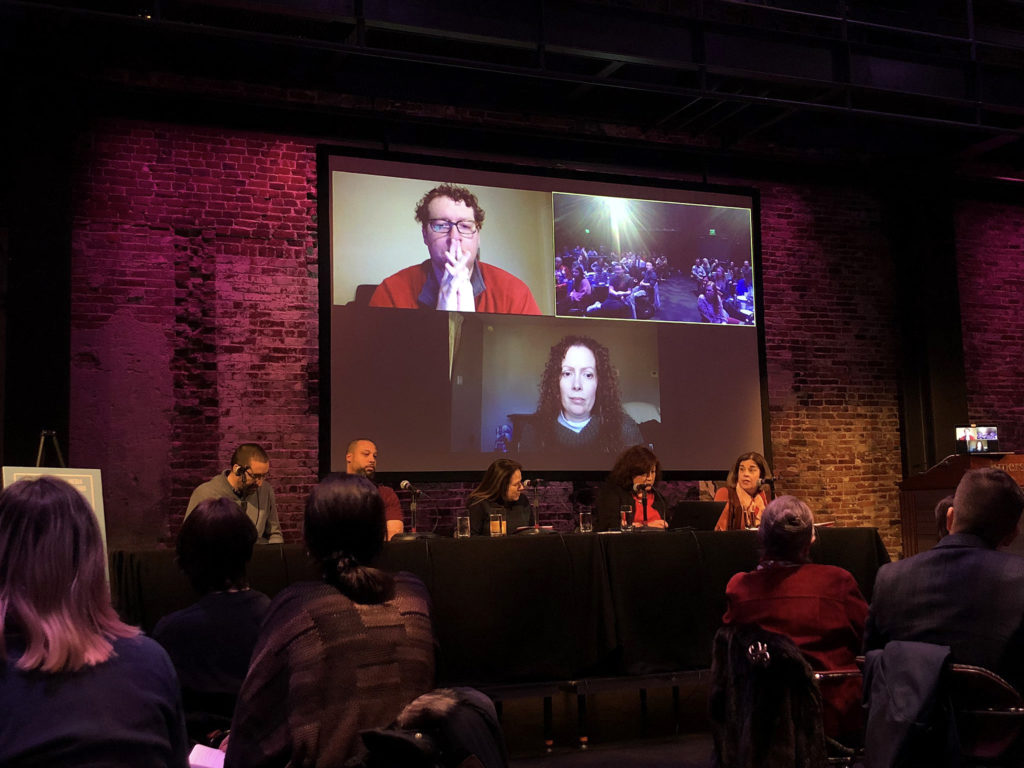
“For some, pessimism can be debilitating. For others, [it is] energizing, enlightening, and reflexive. I think pessimism shouldn’t be about solutions, …but perhaps it can lead others to some ideas of improvement. Moses was known and will continue to be known for his critical perspective- his optimistic perspective and his influence on each of us, and I appreciate that and I’m glad he left that mark. … I’m not confident he would ever come to my side at the optimist-pessimist table and I wouldn’t ask him to. I loved that tension between us, and I miss having that tension without Moses.”
— Robert (Ted) Gutsche, Jr.
A SCREENING OF SHUMOW’S DOCUMENTARY, Liberty Square: History, Power, and Race in Miami: In December 2015, Shumow was awarded a Restorative Narrative Fellowship from the journalism organization Images and Voices of Hope. The fellowship allowed him to pursue a project he had been hoping to produce for some time: a documentary film about the rich history and legacy of one of the country’s oldest public housing projects: Liberty Square, in the heart of Miami’s Liberty City.
“Moses had a specific passion for the power of film to change narratives, to bring narratives to communities whose narratives were not prioritized into light – so he believed in that power,” said Mihailidis
“[Moses], more than any of my other colleagues, began to show me what it looks like to take pedagogy out of the classroom and into communities you feel passionate about serving. I remember how passionate he was about [Liberty Square] and talking about developers trying to move people out… So you had people trying to move residents out after recognizing climate change is occurring, and now they’re taking back land from some of the most vulnerable people because they see the true value of the land. I had never, maybe to my own fault, thought about going through these public documents and participate in these meetings in a very persistent and consistent way. Moses walked it. Those of us who had seen his presentation couldn’t help but be moved – but he lived it. And that was the biggest impact he had on me.”
— Christopher Harris
THE FIRST TRANSFORMATIVE MEDIA LITERACY SCHOLAR AWARD was also introduced at the symposium. The purpose of the award is to recognize and provide opportunities for emerging teachers, scholar activists, and organic intellectuals to engage in transformative teaching and research practices, and learn leadership skills for impactful work in our current digital culture.
NOMINATE A YOUNG ACADEMIC OR GRADUATE STUDENT that is doing exceptional work at the intersection of journalism education, participatory media, media literacy, community activism and social justice.
Awardees will be granted participation at the Salzburg Academy on Media Global Change July 19 – August 5.
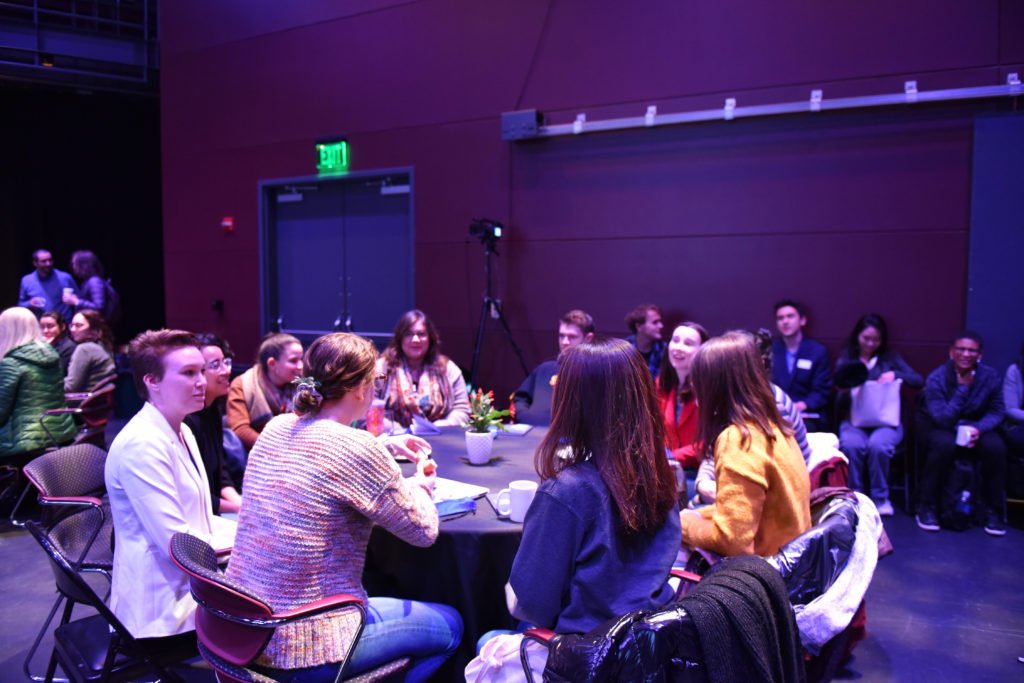
“Moses was a mighty man and he cast a big shadow, but he believed that we all have our own light, our own capacity to create change, and that it is our duty to make it manifest within our role — whether it be as a friend, a parent, a mentor, an educator, a student, a documentarian, or a storyteller… Moses poured himself into the work he believed in. And he’s kept alive, not only by the legacy of his efforts, but by the people who want to shift the window of discourse as he did.”
— Rose Shumow
Categories